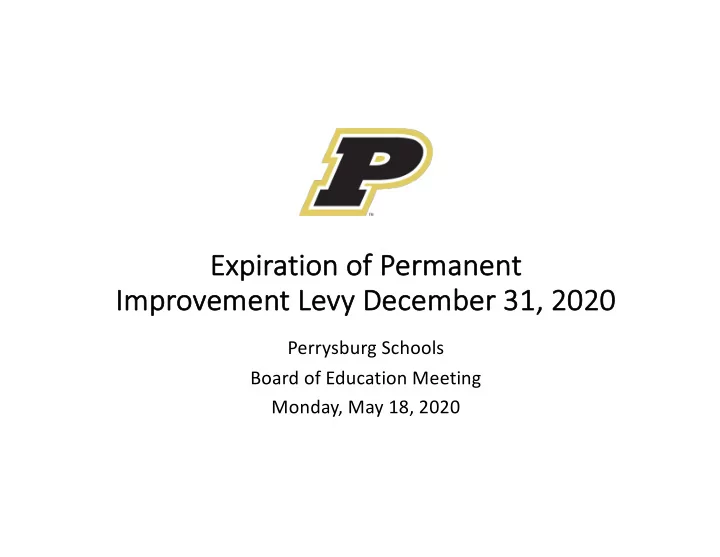

Exp Expirati tion o of P Permanent t Im Improvement Le Levy Dece cember r 31, 2020 Perrysburg Schools Board of Education Meeting Monday, May 18, 2020
Back to the Future - 2015
What Was Happening in 2015 • William and Kate welcomed their 8-pound, 3 ounce baby girl, Charlotte, on May 1, 2015 • Five-time NBA champion Kobe Bryant announced his retirement • Starbucks released its annual holiday cup – it was the minimal red design that was not well-received • The murder trial for Aaron Hernandez began in Fall River, Mass. • The Ohio State University defeated the University of Michigan 42-13 in Ann Arbor, Michigan • The PHS Yellow Jackets went 13-1 and made the state play-offs final 4 (*Also defeated Maumee 49-21)
Perrysburg Schools BOE began a conversation about the permanent improvement levy that was set to expire on December 31, 2015.
Wh Why are we here? • On December 31, 2020, the 5-year permanent improvement levy passed on November 3, 2015 is set to expire. • It generates approximately $1.6 million annually to be used for non-personnel school building maintenance and repairs. • The Board will need to make a decision to either let it expire or place it on the ballot as a renewal or replacement.
Permanent Improvement funds can ONLY be used for maintaining buildings, purchasing buses and educational equipment. They cannot be used for personnel or the day-to-day operation of the school district.
Current (2015-2020) PI Levy In 2015, the 1.9 mill Permanent Improvement Levy was passed with a monthly cost on a $200,000 home of $9.70.
Proposed PI Levy (2020-2025) We would ask the County Auditor to renew this levy at the same 1.9 millage rate that was passed in 2015.
Perrysburg residents value their school buildings and grounds. As a result, residents have viewed the Permanent Improvement Levy as a sound investment. YEAR Election Outcome 1985 Approved 1990 Approved 1995 Approved 2000 Approved 2005 Approved 2010 Approved 2015 Approved
Homeowner Investment • Home and business owners understand the “Pay me now or pay me more later” principle when it comes to investing in roofs, windows, heaters, parking lots and other vital infrastructure. • This type of levy gives the schools a designated revenue stream for this purpose. • If funds are not available via the Permanent Improvement levy to the school district, then such things as boilers, roofs, parking lot and sidewalk repairs would be taken out of the general fund used to pay for student programming, faculty and staff member salaries.
Example of Projects to be Included 2020-2025 • PHS - STEM Lab upgrades - • HPI/PJHS/PHS - Orchestra/Band electrical, etc. Instrument replacement $35,000 each • PJHS - Industrial Tech Room dust collector • PHS - Stage Floor • PJHS - PE lockers for girl's locker • PJHS - Partial roof replacement room • Frank - New cafeteria tables • Woodland – exterior tuck-pointing • Woodland - Window replacement • Fort Meigs - Installation of • Fort Meigs - Roof replacement/ recirculating pump repairs • Frank - Partial roof replacement • Toth - Partial Roof replacement • Toth - Replace drains in basement • Frank & Woodland - Door hardware for accessibility
NE NEXT XT STEPS
2020 - Board Decisions to be Made • Are the funds needed? • If yes, how much should be requested? • What type and length of levy is needed? • What should the funds be used for?
COVID-19 • We wish this levy was expiring next year. • The Board would never bring a new levy to residents at this time. • The Board is now wrestling with asking voters to renew a levy that has been part of maintaining the school district’s facilities since 1980.
Decision Steps for the Board – First Step A Resolution of Necessity must be filed with the county auditor no later than 90 days before the election date, which is August 5.
Decision Steps for the Board – Second Step County Auditor's certification - Under R.C. 5705.03, the County Auditor determines the total current tax valuation and the dollar amount of revenue the levy would generate in the first year of collection.
Decision Steps for the Board – Third Step Resolution to proceed - The Board of Education determines to proceed with the levy; states the rate of the tax levy, expressed in mills for each one dollar in tax valuation as estimated by the County Auditor; states that the taxing authority will proceed with the submission of the question of the tax to the electorate; provides ballot form, including specific language if imposed in the current tax year, e.g. "commencing in 2020, first due in calendar year 2021." A two-thirds vote of all members of the Board of Education is required.
If the Board chooses a renewal… This would not be a new tax. In fact, it would be levied at the current effective rate, which would continue to decrease over time.
This is NO NOT a new tax. If the Board were to choose to place this before voters in November, the it would renew a five-year 1.9-mill levy passed in 2010, which expires at the end of the year.
Th Than ank You ou! An Any Ques estions?
Recommend
More recommend